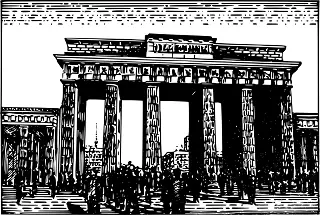U.S. Presidents on Berlin
Read (and complete) these selections from speeches by two U.S. presidents on Berlin to practice more academic vocabulary. Notice the similarities in their vision and hopes for West Berlin, for Germany, and for freedom in the world.
 The Brandenburg Gate-- a symbol of Berlin
The Brandenburg Gate-- a symbol of BerlinI was struck by Kennedy’s and Reagan’s (and Obama’s, in a later speech here) shared vision of the importance of defending freedom in every part of the world, and their determination to keep American commitments to their allies.
Americans have had many bitter disagreements on foreign policy. However, since the 1940s both major parties and their leaders have expressed the same fundamental sense of involvement with other nations and of cooperation with those who share basic values.
In John F. Kennedy’s State of the Union address in Jan. 1961 and his famous Inaugural address (earlier that month), you can find the same ideals and concerns. He also expresses his view of the problem clearly in his Report to the American People on the Berlin Crisis that July (audio-- or click on the transcript button to read it) and his famous ‘Ich Bin ein Berliner’ speech (transcript and audio-- 6 minutes) in 1963. (There is a very short selection from each speech below.)
The Cold War had changed by 1987, and President Reagan saw hope ahead, but his Berlin speech, with the famous line “Mr. Gorbachek, tear down this wall!” echoed many of Kennedy’s thoughts.
(The wall came down, suddenly, in 1989. President Barak Obama refers to that time and what led up to it in his speech in Poland in 2014.)
Although Kennedy and Obama were Democrats and Reagan was a Republican—with some strong disagreements about how the American government should serve its people—their views on America’s place in the world, over 50 years, have a great deal in common.
President Kennedy on Berlin
A selection from his Report on the Berlin Crisis:
"We cannot and will not permit the Communists to drive us out of Berlin, either gradually or by force. For the fulfillment of our pledge to that city is essential to the morale and security of Western Germany, to the unity of Western Europe, and to the faith of the entire Free World... The strength of the alliance on which our security depends is dependent in turn on our willingness to meet our commitments to them.
So long as the Communists insist that they are preparing to end by themselves unilaterally our rights in West Berlin and our commitments to its people, we must be prepared to defend those rights and those commitments. We will at all times be ready to talk, if talk will help. But we must also be ready to resist with force, if force is used upon us. Either alone would fail. Together, they can serve the cause of freedom and peace."
This is from Kennedy's 1963 speech in Berlin:
"Freedom has many difficulties and democracy is not perfect, but we have never had to put a wall up to keep our people in, to prevent them from leaving us...
What is true of this city is true of Germany--real, lasting peace in Europe can never be assured as long as one German out of four is denied the elementary right of free men, and that is to make a free choice. Freedom is indivisible, and when one man is enslaved, all are not free...
All free men, wherever they may live, are citizens of Berlin, and, therefore, as a free man, I take pride in the words "Ich bin ein Berliner."
President Reagan at the Berlin Wall
In these selections from Reagan’s speech, fill in the gap with the words below. (They’re all from the Academic Word List. Several are different forms of the words practiced on the first Practice Academic Vocabulary page on Kennedy’s State of the Union address.)
That page also give some hints at how to fill th gaps, by first looking at the part of speech needed, and then seeing what meaning best fits. Note that words ending in -ed or -ing may be verbs or adjectives, words that end in -al are adjectives, and words ending in -ion are nouns.)
The words to use (also in the drop-down menu by each gap):
achieved, benefits, capacity, conclusion, cooperate, crucial, declining, fundamental, innovation, maintain, policy, predicted, seek, technological, transforming, unprecedented.
For more practice with related vocabulary, see the gap-fill exercise using part of Obama’s Polish Freedom Day speech.
Home> TOEFL & IELTS Vocabulary > U.S. Presidents on Berlin.
Didn't find what you
needed? Explain what you want in the search box below.
(For example, cognates, past tense practice, or 'get along with.') Click to see the related pages on EnglishHints.
| site search by freefind | advanced |






New! Comments
What do you think about what you just read? Leave me a comment in the box below.